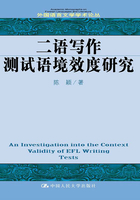
1.2 Aim and objectives of the study
The present study explored the context validity of writing tests by investigating the possible impact of contextual features on Chinese non-English-major undergraduates' writing performance. We hope that by improving the design of writing test tasks, writing tests will exert more beneficiary washback effects on the teaching and learning of EFL writing in colleges and universities in our country. Thus, the primary research question addressed in the present study was:
What is the context validity of writing tests?
Weir (2005) introduced the term “context validity” into language testing field and proposed a list of possible contextual factors that could be taken into consideration when testing writing. However, he did not explain how to operationalize “context validity” in writing task construction. Nor did he justify the components of his list. On the other hand, it should be noted that in real-life communication, a plethora of contextual factors are involved. With regard to designing writing tasks for pedagogical and testing purposes, however, some of the contextual factors (e.g., weather, place, time, etc.) may not affect the performance of a language user. Hence the first sub-question that we set out to investigate is:
RQ1: What contextual features should be included in writing tasks?
An understanding of the effects of contextual features on test-takers' writing performance should take into consideration the possible impact of these features on the writing product. The analysis of the written product is often conducted in two ways: the statistical analysis of the essay scores awarded by raters and the text analysis of the written texts. Given the very fact that statistical analysis of scores awarded by raters alone might obscure some of the important features of written texts, the present study employs the analysis of both scores and the written texts. Hence, the second and third sub-questions are:
RQ2: What effects do the writing tasks with different degrees of contextual features have on the overall quality of EFL test-takers' writing, as quantified by the essay rating?
RQ3: What effects do the writing tasks with different degrees of contextual features have on the textual features of EFL test-takers' writing, as measured by the text analysis?
When working on different types of writing tasks, writers might be engaged in different writing processes. To fully understand the effects of contextual features on test-takers' writing performance, we should also take into consideration the possible impact of these features on test-takers' writing process as well.
Moreover,the writing process is not only related to the widely recognized cognitive process such as planning and revising,but also to testtakers' affect such as their attitude towards and interest in writing tasks. In the field of writing assessment,however,the focus has been laid dominantly on writing proficiency; relatively little attention has been paid to affective aspects,in spite of the fact that affect is increasingly seen as an important contributor to writing proficiency (Bruning & Horn,2000;Crystal,1997). This is undesirable,as Rueda and Chen (2005: 222) rightly warned,“[A]n assessment focus on proficiency alone,without reference to motivational factors,may limit instructionally valuable information”. Moreover,research has evidenced that a lack of engagement is likely to result in poor test performance (e.g.,Powers & Fowles,1999;Tobias,1994). In a similar vein,Weigle (2002: 25) explicitly stated that affective factors “may influence the way a writer goes about the task of writing and the effort that will be put into the writing task”. Therefore,it is of vital importance to investigate affective aspects of test-takers' writing so as to more fully understand the effects of writing tasks with different degrees of contextual features on their performance. Besides,fewer studies have been undertaken to investigate the writing process of L2 writers by giving a balanced focus to both the cognitive and affective aspects of composing (Wong,2005). Therefore,there is an urgent need to carry out in-depth investigations into test-takers' affective domain of writing and to explore the relationship,if any,between the affective and cognitive factors involved in writing and their effects on the writing performance. Thus,the fourth and fifth sub-questions are:
RQ4: What effects do the writing tasks with different degrees of contextual features have on EFL test-takers' cognitive processes of writing?
RQ5: What effects do the writing tasks with different degrees of contextual features have on EFL test-takers' affective domain of writing?